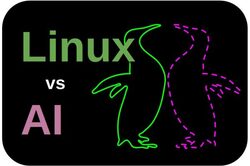Is Linux the only platform left to escape AI?
Artificial Intelligence, or AI, has been occupying our minds for decades, or even hundreds or thousands of years if we look as far as at Greek mythology and medieval legends. If we focus on AI primarily from the perspective of thinking machines, then the origins will probably lie in the 1940s. But if we look at the real momentum that AI has entered and the visible impact that AI is suddenly starting to have around us, we don’t have to go back more than a few years. And right now, AI seems to be the talk of the town. More and more AI-based solutions seem to follow one another, with ever greater promises and apparent benefits for us as humans. Web browsers are getting built-in AI functionality, Search Engines are being built on an AI foundation, different software applications are getting AI support, and even Operating Systems are getting built-in AI technology. And all of this should help us to…well, to what actually? There seems to be a growing feeling that we will soon no longer be able to ignore AI, but what if you do not yet see only positives in AI, are wary of what AI will mean for the world, are thinking about the environmental impact of AI, or simply do not yet want AI being integrated into your computer use, is there still an option available to use your computer the old fashioned way? In this article, we will look at Linux as a platform to escape the AI race for a while.
There seems to be no article, blog post, or YouTube video published lately that does not mention something about AI. There are many use cases described where AI can greatly improve and enrich our lives. Productivity experts and enthusiasts present us with the most fantastic possibilities that AI already has to offer, even though it is still in its infancy. The possibilities are already endless. We were recently able to generate photo-realistic images based on a number of commands. We can have entire articles written for us by only offering a number of thoughts to the AI engine. Recently, we have even had very realistic short films generated based on a number of creative statements. From a productivity perspective, we are tempted by the possibility of having a received email summarized for us. On the other hand, we are also offered the possibility of having an email generated for us based on a number of cleverly described commands. But what are we actually doing? Has the recipient of an email not earned the respect to read a text with ideas that have actually been composed for you by hand by the sender? And does a writer of an email not deserve the respect that his or her content is actually read with attention and that the important nuances are not missed? Do we really think it’s okay that we no longer give each other sincere attention for what we have to say to each other and what we have produced for each other? There are a lot of questions that concern me about AI. I am a person who usually finds it very important to look at and interpret everything with an objective view, as far as that is possible for a human being. I am therefore not someone who has yet formed a conclusive negative or positive opinion about the use and possibilities of AI. I do see advantages for us as humanity, but I also definitely see dangers and problems on an ethical level at the moment. AI is already being offered to us as if it were a fully-fledged end product, but there are a lot of conceivable situations and outcomes of AI that are currently downright scary, discriminatory, and sometimes even life-threatening. So what should you do as a computer and software user who is still a bit skeptical about AI and wants to calmly wait for developments without having to come into contact with it forcibly or having to use it unintentionally, for example in your operating system? Linux is a very nice platform for that, which still gives you a platform and the possibility to really be in control of what you want to do with your computer and not be forced into a way of working. With Linux, we are still talking about real personal computing and everything you do there is still really personal.

